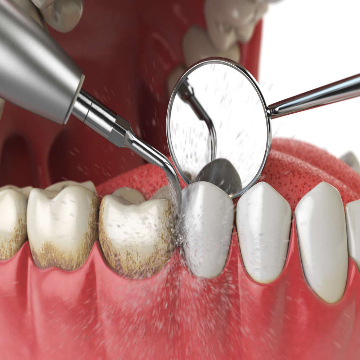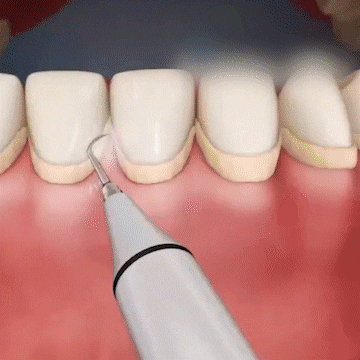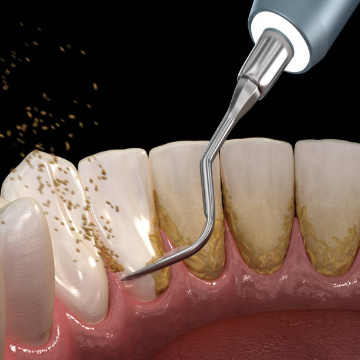Why do I need to get Deep Cleaning of my Teeth?
Dental deep cleaning, also known as scaling, root planing or periodontal therapy, is a non-surgical procedure performed to treat gum disease (periodontal disease). It involves thorough cleaning of the teeth and gums to remove plaque, tartar (calculus), and bacteria from below the gumline.
Steps involved in a Dental Deep Cleaning:
- Examination: We will perform a comprehensive examination of your teeth and gums, which may include X-rays and digital pictures using an intraoral camera. This assessment helps determine the severity of gum disease and the extent of treatment required.
- Local Anesthesia: If needed, a local anesthetic may be administered to numb the area and ensure your comfort during the deep cleaning procedure.
- Scaling: The first step of deep cleaning involves scaling, where we use specialized dental instruments to remove plaque, tartar, and bacteria from the surface of the teeth and below the gumline. This process aims to eliminate the source of infection and inflammation.
- Root Planing: After scaling, root planing is performed to smoothen the tooth roots. This process helps remove any remaining bacteria and prevents further plaque and tartar buildup. Smoothing the roots also facilitates the reattachment of the gums to the teeth, promoting gum healing.
- Antibacterial Rinse: We may apply an antimicrobial rinse or gel to the treated areas to further eliminate bacteria and promote healing.
- Follow-up Care: Dr. Tomar will provide post-treatment instructions, including oral hygiene recommendations and any prescribed medications. They will schedule follow-up appointments to monitor your healing progress and determine the need for additional treatment.



What precautions do I need to take after my Dental Deep Cleaning?
Precautions after Dental Deep Cleaning:
- Sensitivity: After a deep cleaning, you may experience some sensitivity in your teeth and gums, especially to hot or cold temperatures. This sensitivity is usually temporary and should improve over time. If the sensitivity persists or becomes severe call us at (253) 529-9434.
- Gum Discomfort: It is common to experience some tenderness or discomfort in the gums after a deep cleaning. This is a normal part of the healing process. Rinse your mouth gently with warm saltwater to help alleviate any discomfort. Over-the-counter pain relievers can also be used if necessary.
- Oral Hygiene: Maintain excellent oral hygiene to support the healing process and prevent further gum disease. Brush your teeth gently twice a day with a soft-bristled toothbrush. Use an antimicrobial mouthwash, as recommended by the doctor. Floss daily to remove plaque and bacteria from between your teeth.
- Avoid Irritants: Avoid smoking, as it can delay healing and increase the risk of gum disease. Limit consumption of alcohol, as it can irritate the gums. Avoid spicy or excessively hot foods that may aggravate gum sensitivity.
- Follow-up Appointments: Schedule and attend any follow-up appointments recommended by the doctor. These visits allow us to monitor your healing progress, evaluate the effectiveness of the deep cleaning, and provide any additional treatments if needed.
Regular dental check-ups and cleanings, along with proper oral hygiene, are crucial for maintaining the health of your gums and preventing the recurrence of gum disease.



